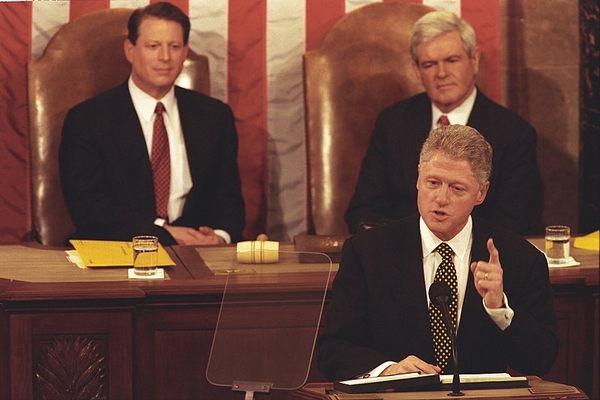 President Clinton delivering the State of the Union address on Jan. 27, 1998. |
IT ISN'T ONLY bimbo eruptions that bring out the brazen deceiver in Bill Clinton. State of the Union addresses do, too. As egregious as any falsehood the president has offered in the Monica Lewinsky business was the preposterous claim he made to a joint session of Congress last week: "My fellow Americans . . . We have the smallest government in 35 years."
This, not 10 paragraphs into a speech that would go on to call for new government action to:
- Reduce the size of classes in public schools.
- End "social promotion" from one grade to the next.
- Raise cigarette taxes (again).
- Extend the Family Leave Act to guarantee time off for parent-teacher meetings.
- "Dramatically expand" after-school programs.
- Impose new restrictions on HMOs.
- Extend Medicare to people in their 50s.
- Create new child-care subsidies.
- Hike spending on "training dislocated workers."
- Provide free TV time for politicians.
- Spend even more public funds on "arts and humanities."
- Build another Internet.
"The smallest government in 35 years"? Clinton's own speech sketched a portrait of a federal government entangled as never before in every aspect of Americans' lives. Not even in wartime has Washington intruded as obnoxiously and expensively into the affairs of ordinary citizens as it routinely does today. In our time, everything is the federal government's business, from the lunches in school cafeterias to the hiring practices at Hooters.
Have you been to Washington lately? Walk down any main thoroughfare and you pass one federal behemoth after another. City blocks that 35 years ago were filled with townhouses and grocery stores have long since been washed away by an alphabet soup of government agencies, from the ACHP (Advisory Council on Historic Preservation) to the USFWS (US Fish and Wildlife Service). Cabinet departments that didn't exist 35 years ago not only occupy gargantuan edifices, but have become politically untouchable.
The Department of Education, to take a single example, was created in 1979. For years Republicans swore to abolish it if they ever took control of Congress, arguing rightly that education is not properly a federal concern. But the Republican-controlled 105th Congress increased the DOE budget by 11 percent last fall. Was that an illustration of "the smallest government in 35 years?"
Really, what was Clinton talking about? Is federal spending at its smallest level in 35 years? Far from it. Federal outlays in 1998 will total $ 1.69 trillion, the most ever. "In 1998, the government will spend more money," the Cato Institute calculates, "than the inflation-adjusted total of all federal expenditures from 1787 to 1930."
Is the national debt the smallest it has been in 35 years? Far from it. As of Monday it had reached $5,499,144,697,585.36, and was climbing by $628 million a day. The portion of this debt borne by each American citizen is well over $20,000. That, too, is a record.
Is the share of national output consumed by the federal government smaller than it has been in 35 years? Far from it. Federal revenues as a portion of the Gross Domestic Product have never been higher. In 1998, Washington will confiscate 20.8 percent of every dollar produced in the United States.
Is the tax burden at its smallest level in 35 years? Far from it. According to the Tax Foundation, a nonpartisan research center in Washington, the median two-earner family last year shouldered $15,394 in federal taxes — income, payroll, and otherwise. State and local governments claimed another $7,127. All told, taxes now eat up 38.2 percent of the typical family's budget — more than food, clothing, housing, and transportation. Combined.
By one measure only is the government at a 35-year low: number of employees. Because the military has been so drastically downsized since the end of the Cold War, fewer people are on the federal payroll than at any time since the mid-'60s. But when it comes to domestic affairs, the bureaucracy controlled by Washington is at or near an all-time high.
Here is the truth: The federal government is more enormous and more expensive than at any time in our history. And here is another truth: The more power Washington is given to do things for us, the more power it has to do things to us.
When Americans focus on the trees — a computer in every classroom? longer hospital stays for childbirth? — they may favor this or that activity of the federal establishment. But ask them to step back and look at the forest, and they express contempt and alarm. In the early 1960s, Americans overwhelmingly trusted the federal government to do the right thing and to do it honestly. Today Americans overwhelmingly believe the government is crooked and expect it to make things worse. Numerous polls confirm it.
Never have Americans been taxed so severely. Never have they trusted government less. That is the real state of the Union, and if Bill Clinton were not so dishonest, he might have said so last week.
(Jeff Jacoby is a columnist for The Boston Globe).
-- ## --
Follow Jeff Jacoby on Twitter.
Discuss his columns on Facebook.
Want to read more? Sign up for "Arguable," Jeff Jacoby's free weekly email newsletter.

